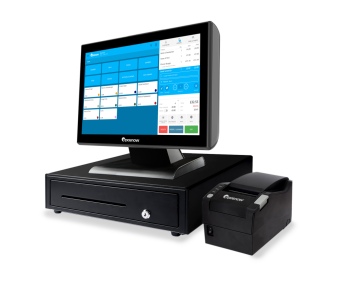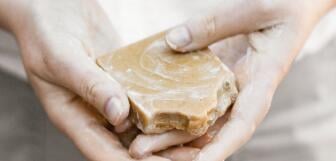How to Make Soap to Sell: Start Your Own Soap-Making Business Today!
The art of soap making has a five thousand-year legacy dating back to ancient Babylon. Even so, most people don't have a clue how to make a soap they love. This has opened up a big opportunity for specialist soaps to be made - as demand is high for these artisanal soaps. Meaning small companies can compete with bigger brands by offering something they can't.
Consumers often look to smaller providers for soaps as they trust handcrafted soap producers more than the hard, cold process that most soap companies use. Now, many entrepreneurs think about stepping into the soap business to provide a top-quality product. But few make the leap. So what are the barriers that make starting out in soap difficult? And how can you ensure that you sell soap successfully? Here's the Epos Now guide to soap and how you can sell it.
Is starting a soap company right for you?
Some of the reasons many aspiring soap makers hesitate before beginning their soap-making journey begin to appear when they compose their business plan and research the industry. It's a lot of work to figure out how you can get started, and many factors can influence the potential success of your business.
What local and online competition will you face?
As with most areas of retail, there is a strong market for online stores selling soap, but a large part of your customer base is likely to be shopping in stores. You may be able to sell soap as a distributor, so looking at local independent and chain shops that might consider using you as a supplier is worthwhile.
However, if local stores already have a soap supplier, you may not be able to obtain their custom or will be competing with an established business. This isn't something you want to only find out about after committing to a business plan, so ensure you speak with potential partners as you look to set up.
It will also be necessary for you to decide whether you'll be going online and selling your products from a website. Checking out what has made established online soap distributors successful could help you take good steps early on. If you conduct this research and smell the soapy scent of opportunity, then this could be the start of something great.
What's going to make your soap stand out?
Branding is particularly important for most soap companies to stand out from other soap bars. Creating something special within this industry could be in design, scent, or a slightly different soap recipe. Whatever you do, ensure you create a marketable product your customers can enjoy.
You could stress that you're selling homemade soap, free from all the ingredients people fear could damage their skin, that is often used by big brand producers. A simple recipe with natural ingredients and essential oils could be exactly the soap your local community is looking for.
Alternatively, you could stress that your business creates handcrafted soaps. Distinct from the homemade soaps angle, branding yourself around craft gives the impression that each bar has had the human touch. This could combine well with a novel shape to your bars, such as natural figurines, which can sell well as works of art.
Can you obtain the necessary licenses and learn relevant laws?
Starting any business involves licensing and registration. Because soap is used on the body and the production process involves chemicals that, if used badly, could be harmful to people and animals, even a homemade soap business needs to follow government regulations to sell to the public. Cosmetics regulations like these will need to be followed strictly, so studying them and knowing them well will be worthwhile in the long run.
Can you obtain grants and save the money needed to start the business?
You can apply for grants to help get your business started. Making soap involves some expensive ingredients, and you'll also need to purchase the necessary equipment, design, and produce packaging. If you're going to sell the soap yourself, you may need to produce a website (or premises) and a POS, which all cost money.
The UK government website documents information on business grants which you can apply to for help when you start out, which can make a huge difference[1].
Most of the money will need to be self-funded. However, you'll be relieved to hear that producing natural soaps doesn't need the volume of expensive equipment used in other production lines.
Epos Now POS: the best thing for any new business
Epos Now provide the very best business tools with the flexibility to shape any profitable business with what it needs to flourish:
- Create a full business suite on a solid retail POS system foundation with integrated card payments, sell online with a website, and through multi-site and multi-channel options.
- Sell your own way with hardware and software options for every industry, including an in-house payment processing service.
- Save time with seamless card integrations on mobile and countertop card payment devices.
- Know your business better with hundreds of detailed, easy-to-read business reports.

What equipment is needed to produce soaps?
If you're planning to invest in your soap business, one area it's not worth making cuts on is the equipment you'll be using to produce your product. Ultimately, the equipment and ingredients will be what wins you new customers who come back for more when the soap bars run out.
Purchasing commercial-grade equipment means spending less time producing the soap, producing more bars, and making it easier to create a better quality product. The equipment you'll need includes:
- A commercial-grade mixer. Soap is an emulsifier, which means that the different oils it contains can mix with water and dirt in a way it usually wouldn't. This happens because of the emulsification in the production process. A commercial-grade mixer can help you mix two usually non-attractive liquids together.
- Mixing bowls. These may not be your biggest expense, but you'll want larger mixing bowls than those you find in a household kitchen!
- Soap moulds. If you're going to produce more than one bar at a time, you'll need moulds to help you create dozens at a time. If you have a bespoke design, this may be quite expensive as you'll need to pay for specially designed moulds.
- Scales. You'll want an efficient way of standardizing the weight of your bars. This means having an accurate, dependable set of scales you can use for this process.
- Goggles, gloves, and masks. Anyone involved in production will need the necessary safety equipment.
Soap making: saponification
Oil is a foundational ingredient in the chemical reaction that creates the soap itself. Soap is actually a byproduct of the saponification of fatty oils and can be scientifically categorized as a salt. Most soaps people use have additional additives to a simple soap created during saponification.
This crucial chemical reaction creates a second compound: glycerin. The glycerin created during saponification can be left in the soap or removed through a precipitation process. Leaving glycerin in your soap will simplify the process and create a handmade, vegan-friendly, natural soap that will lead your business towards a younger, environmentally conscious target market, as well as being excellent for sensitive skin.
Typical soap ingredients
The number of ingredients needed to make soap isn't as expensive as you might expect. But each choice you make has a big impact on the qualities your soap will have, which makes thinking about soap recipes crucial for your enterprise.
The basic ingredients of soap tend to be similar, although there are traditional variations many soap makers use that can have a similar effect while bringing small differences to the end product.
Oils used in soap making
Some oils that bring desired textual, cleansing, or conditioning qualities may not mix well into a hard soap that offers a lasting bar and some soap makers choose to use a fat or oil to create a harder bar.
The essential oils and fats in soap-making come from many different sources. A few examples might include:
Olive oil is a gentle choice for soap makers, and like glycerin soaps, it is a good choice for those with sensitive skin. The flip side of this is that soaps made with olive oil will not offer as vigorous a cleanse as others. These soaps will be softer and less durable, which is not necessarily a negative characteristic, but might make some soap makers want to mix olive and another oil together to add a little more durability to the bar.
Coconut oil is renowned for providing a thorough, effective cleansing soap, but it can also dry out the skin more than the alternatives. If you're looking for a slightly rougher soap for aggressive washers, coconut oil could be a good choice. However, using coconut oil mixed with a larger proportion of fatty ingredients can add the extra nourishment that many users will desire.
Butters and fats
Shea butter is a common choice. It contains many fatty acids that moisturize the skin when used rather than leaving the user feeling dry after use.
Cocoa butter is another popular choice. Both shea and cocoa butter will harden your soap bars and will add a nourishing quality. These butters should compose around 20% of your ingredients.
Animal fats, including lard and tallow, often make large portions of a soap bar. Of course, using these kinds of ingredients limits your access to some parts of the market that prefer vegan or vegetarian soaps. It's perfectly possible to make soap without these ingredients, however they have traditionally been a part of the process. Instead, you could purchase palm oil to use instead, or a synthetic sodium that many larger businesses in the industry use.
Lye
A useful substance historically found by leaching wood ashes, Lye is used in curing and tenderizing foods but is also a key ingredient in many household cleaning substances, as well as soap.
Lye, or sodium hydroxide, is the catalyst in the chemical reaction that brings out the salt from the oil used to create the soap. As a result of being the catalytic ingredient and corrosive, you'll need to be careful when using it and ensure it does not come into contact with anything it could react with, such as aluminium (through which it creates hydrogen gas).
Don't let that put you off, though, as using a lye calculator, and being disciplined in how you handle your lye, should help you create and sell soap safely. Lye is very soluble in water, so you'll need to mix a lye solution before adding just the right amount to your oil.
Soap making methods
Creating handmade soap still involves the complex chemical process required to produce the much-loved substance we use every day. But you could use one of a number of methods to do this, leading to slightly different soaps.
Cold process
The cold method of soap-making is the oldest traditional method dating back to the Babylonians. This method takes a long time to work, as the saponification alone takes 48 hours, but the mixture must then be left for many weeks to cure in soap moulds as it hardens into a soap bar your customers can use.
One of the advantages of using a cold process is that none of your ingredients will experience any damage or attrition through heating. This can lead to more natural scents and more nourishing soap.
Hot process
The hot process uses heat to lower the time it takes to get the soap base into the mould. If you're looking to run your business made-to-order, you would need to use this method to produce the right amount of product in a reasonable time frame. This still requires one to two weeks, but this is still four weeks quicker than using a cold process.
In the cold process, there is enough heat in the chemical reaction between the lye and the oil for the soap to begin forming. Intricate designs can be made this way, turning soap-making into a potential art form. However, the hot process leaves no room for that, and you'll be limited to more basic shapes in your mould.
The scents you create through the hot process may be a little different as the external heat will act on your fragrances as well as influence the chemical process. The rougher bars created using this method can be textually different, which some of your customers may prefer.
Other methods: melt and pour
The most popular choice for beginners! Melt and pour is a great option for aspiring soap makers. It involves mixing your ingredients together, melting them down, and adding your lye, creating pre-made soap bases you can use in your cold process. This makes your soap easy to colour and scent, allowing you to experiment quickly and easily.
Use Epos Now to get your new soap business off the ground
You may not have had your own website before and may still be having a chemical reaction to the shock of running your own business, but Epos Now systems can clean up your business operations like your soap cleans dirty skin.
Selling at pop-up tents, attending trade shows, running a website, or even your own shop can be simplified using your Epos Now point of sale. The Epos Now POS system can integrate business software and your website to run inventory, price products, market your business and generate reports all in one place.
- Choose from hundreds of apps and integrable partner programs to run accounting, marketing, and other back-of-house functions in a way that suits you.
- Access reports and manage prices and inventory on-site or off, night or day, for an online store and brick-and-mortar, all through cloud-based data storage.
- Create bespoke transaction setups on secure, speedy software to shave time off the sales process, and join Epos Now Payments for integrated card payment technology.
- Implement loyalty programs to retain customers using in-house or 3rd party partnerships.
Get in touch with our expert team by submitting your details below, and join over 55,000 businesses that start selling using Epos Now technology.
You may also like:
Join Epos Now for modifiable software and flexible hardware to suit your industry
trusted by over 55,000 businesses worldwide




